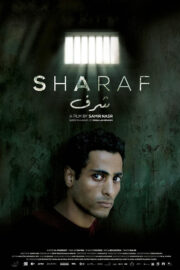Sharaf
When Sharaf is sent to prison for killing a man in self-defense, he is abruptly torn from his dreams of wealth and consumption.
The microcosm of the prison reflects the complex situation of Arab society, which suffers from dictatorship and poverty, dependent on an unjust global economic system. Sharaf decides to achieve his own social advancement behind bars. But he has to pay a very high price.
Cast
- Sharaf
- Ahmed El Munirawi
- Dr. Ramzy
- Fadi Abi Samra
- Hoda
- Jala Hisham
- Officer Edko
- Khaled Houissa
- Sharaf's mother
- Salha Nasraoui
- Lieutnant Ittra
- Laarousi el Hanachi

Sharaf
Samir Nasr
- Fiction
- Production Country / Year
- Germany, Tunisia, France, Luxembourg 2021
- Language
- ar. OF m. dt. UT
- Format
- DCP, Color, 94min
2.39:1, Discrete 5.1
Director & Crew

Samir Nasr
Born in 1968 in Karlsruhe, grew up in Libya and Egypt. Studied Economics in Mannheim and Screenwriting and Directing at the Film Academy Baden-Württemberg. Active as a director, writer, editor and instructor.
Filmography
| 1996 | Brot | Kurzfilm | |
| 1999 | Nachttanke | Dokumentarfilm | 1999 |
| 2004 | Leben 16 | Dokumentarfilm | |
| 2005 | Folgeschäden | Spielfilm | |
| 2022 | Sharaf | Spielfilm | 2022 |
“SHARAF brings together great extremes. It tells a gloomy story in a laconic, sometimes funny, and always entertaining manner. It paints a picture of a whole society and an ongoing crisis while taking place in a very limited space.
The main character is fascinating in his contradiction between naivety and trickery, like a mixture between Candide and Machiavelli. As the story proceeds, he becomes more and more guilty, but we can’t condemn him for that. He is a perfect example of a new lost generation in the Arab World. They grew up in authoritarian political systems and are deeply influenced by fundamental religious values. Yet they dream of freedom and a Western lifestyle, as they know it through the internet and television. These dreams and high aspirations for the future dominate their thinking while they have no tools or any realistic chance to achieve them.”
Samir Nasr
- Producer
- Silvana Santamaria
- Bilal Athimni
